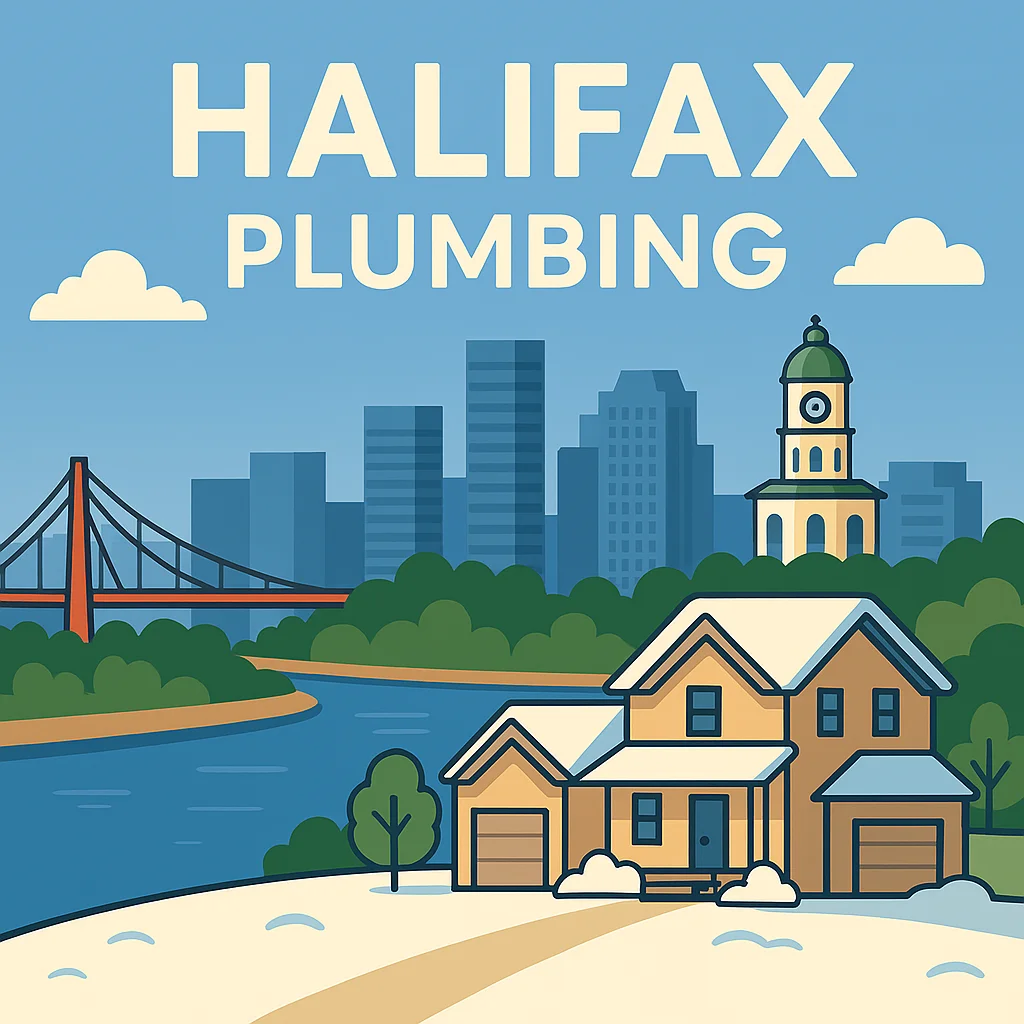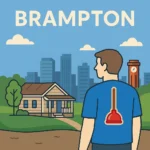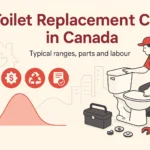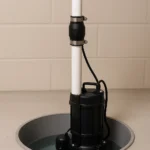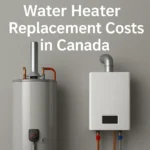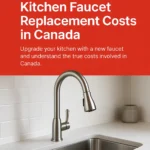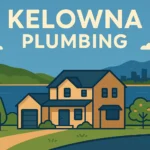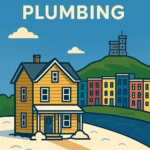Introduction
Halifax is Atlantic Canada’s largest city, with more than 480,000 metro residents and a unique mix of historic waterfront homes, suburban neighbourhoods, and rural communities. With soft city water, coastal weather, and cold winters, plumbing challenges here differ from those in hard-water cities like Calgary or Edmonton. From frozen pipes to stormwater drainage issues, proactive maintenance is key for Halifax homeowners.
Water Source, Quality & Hardness
- Source: Halifax’s drinking water comes from lakes and watersheds, delivered and managed by Halifax Water.
- Quality: Halifax Water maintains a Water Quality Master Plan ensuring supply exceeds provincial and federal standards.
- Hardness: Municipal water is very soft, averaging 0.3–1.8 grains per gallon (gpg) (Aquatell).
- Soft water means less scaling in kettles, appliances, and fixtures.
- Hot water tanks and dishwashers last longer compared to hard-water regions.
- Some rural wells outside the city have moderately hard water and should be tested.
Housing Stock & Plumbing Systems
- Older downtown & waterfront homes (North End, South End, Hydrostone): Many still have aging cast iron or galvanized pipes, some clay sewer laterals.
- Suburbs (Bedford, Clayton Park, Sackville, Cole Harbour): Copper and PEX plumbing is standard, sump pumps more common in newer builds.
- Rural properties: Often rely on private wells and septic tanks. Nova Scotia Health recommends testing well water every 6 months for bacteria and every 2 years for chemical quality.
Common Plumbing Issues in Halifax
- Frozen pipes — long winters create risk for uninsulated garage, crawlspace, or exterior lines.
- Sewer backups — older clay laterals downtown can crack or allow tree root intrusion.
- Basement flooding — coastal storms and spring snowmelt can overwhelm storm sewers.
- Soft water corrosion — unlike scaling, soft water can leach metals from older copper pipes.
- Well and septic maintenance — rural systems need frequent testing and inspection.
Seasonal Considerations
- Winter: Frozen or burst pipes during extended cold spells.
- Spring: Snowmelt and rainfall increase risk of basement flooding.
- Summer: Heavy Atlantic storms can stress storm drains.
- Fall: Homeowners should shut off outdoor taps and inspect sump pumps before freeze-up.
Plumbing Costs in Halifax
Local plumbers in Halifax typically charge a minimum service call of $300–$400 before tax, which covers the first hour or initial inspection. Costs rise for emergencies and complex jobs.
Typical Plumbing Prices in Halifax
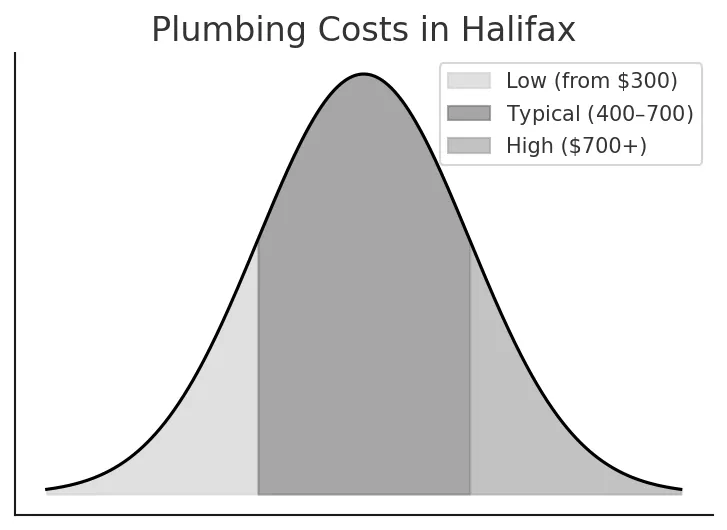
| Service | Low | Typical | High |
|---|---|---|---|
| Drain unclogging | $300 | $400 | $700+ |
| Faucet replacement | $300 | $450 | $850+ |
| Hot water tank replacement | $1,400 | $2,000 | $3,200+ |
| Emergency after-hours call | $450 | $700 | $1,200+ |
⚠️ Disclaimer: Prices are estimates. Costs vary by plumber, job complexity, permits, and materials.
Local Permits & Regulations
- Permits required for most new installations, drainage changes, or fixture relocations.
- Halifax Water manages service connections for water, wastewater, and stormwater. (Halifax Water Regulations PDF)
- Example fees:
- Water service connection (≤75 mm): $375 inspection/tapping fee.
- Backflow prevention device inspection: $150.
- Regional Development Charges (RDC): $1,921.82/unit for water and $6,126.84/unit for wastewater when building new homes.
- Rural wells and septic systems are subject to Nova Scotia health guidelines and inspection requirements.
Case Study: Frozen Pipe Prevention in Bedford
A Bedford homeowner had repeated frozen pipe bursts in their garage. In 2022, they invested in insulation sleeves, rerouted outdoor hose connections to interior shut-off valves, and added heat tape. The upgrades cost about $1,600. During the cold winter of 2023, their pipes stayed intact, avoiding thousands in flood repairs.

FAQs
Is Halifax water hard or soft?
Very soft (0.3–1.8 gpg), meaning little to no scaling in appliances.
Do I need a water softener in Halifax?
No. Most homes connected to Halifax Water do not. Rural wells may require treatment.
What’s the biggest plumbing risk in Halifax?
Frozen pipes in winter and storm-related basement flooding.
Do I need a permit for plumbing changes?
Yes, for new installs, drainage modifications, or fixture relocations.
Who manages water and permits in Halifax?
Halifax Water oversees municipal water, wastewater, and stormwater services.
Tips for Halifax Homeowners
- Insulate pipes before winter.
- Install sump pumps and backwater valves in flood-prone basements.
- Test well water regularly if not on city supply.
- Flush hot water tanks annually to remove sediment.
- Confirm permits and inspections before starting projects.
Conclusion
Halifax’s plumbing challenges stem from soft water, freezing winters, and storm-related flooding risks. With proactive insulation, sump pump maintenance, and regular inspections, homeowners can avoid costly emergencies and extend the life of their systems.
👉 Book a licensed plumber in Halifax today at unclogit.com or call 604-496-1661.

